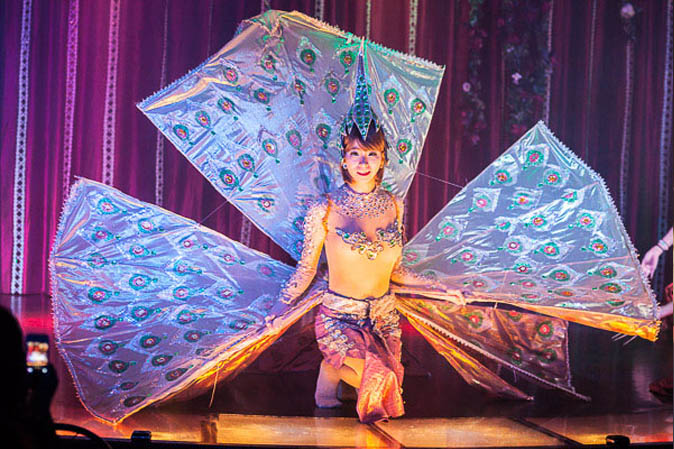ABOVE: Transgender woman performs in cabaret, a famous attraction for visitors to Thailand. Photo: Alexander Hotz
Everyone knows about the transgender women of Thailand, commonly referred to as “ladyboys.” And everyone knows they come in only four flavors: the aspiring beauty pageant diva, the swaggering cabaret performer, the dangerous red light denizen, or the punchline in a movie or lakorn.
For Prempreeda Promoj Na Ayutthaya, these cliche stereotypes create a narrow mindset in the public and harm the LGBT’s own self-perception, leaving them in a dark corner of society.
“Understanding starts from education, and what do we see on TV? We see a Katoey being kicked for comedy because she chases after a man,” said the transgender rights activist and UNESCO program officer. “We see transgender comedians entertain people with her jokes about chasing after a man, and in real life, people think of them that way they are poked fun of on TV.”
With a media that feeds these stereotypes of the lesbian, gay, bisexual and transgender community to the public, Prempreeda is helping to peel back some of those misperceptions with a week of panel discussions, performances and events to help clear things up.
Starting today, the Bangkok Art and Cultural Centre will be washed in rainbow light to commemorate the International Day Against Homophobia, Transphobia, and Biphobia, which marks the World Health Organization’s declassification of homosexuality as a mental disorder on May 17, 1990. The week of youth-oriented events organized by UNESCO and city hall aims to educate the new generation about the realities of the LGBT community and foster respect for all individuals in society, no matter their sexuality.

“In health class, we teach children what their gender role is if they have a male genital, but we never discuss: What if two males want to spend their lives together and how their neighbors and coworkers should treat the couple. These things are not taught in school.”
Coconuts sat down with Prempreeda to discuss the core and cause of the problem that leads to discrimination and violence toward LGBT children in school, which distracts them from their education and leads to limited career opportunities after they leave.
“Recently, there was a popular news story of a transgender sex worker beating a farang woman with her high heels,” Prempreeda pointed out. “People don’t try to understand it means she was desperate. She was out of work and may not have enough to eat for days. This goes back to the employment issues.”
A range of discussions will tackle different aspects of discriminations, such as the use of school uniforms.
As many LGBT children struggle to fit in male and female uniforms and adapt to expectations in school, the topic will be one of the highlighted public discussions in the hope of opening some closed eyes.
“Before they enter employment, they need education. When they go to school and university, uniforms makes kids uncomfortable because some have to wear one that doesn’t match their sexual identity, so those youngsters start adapting their uniform,” Prempreeda said.
Those who don’t risk serious consequences: they can be barred from sitting for exams or run afoul of school rules.
“They tell transmen to go put on a skirt; it’s very terrible for the youth who want to focus on their exam but have to face situations like this,” she added.
Future of all letter acceptance
As a transgender rights activist, Prempreeda said Thai society has become more aware of portions of the LGBT community, especially gay men. The Love of Siam (2007), a film which portrayed a romance between two men, made progress while more events and venues for discussion, such as this week’s event, have given voice to more conversations about sexual orientation.
There’s a personal dimension to it for Prempreeda who discussed her own personal history trying to addressing the issue.
“There was no space for me to speak about it 15 years ago,” she said of her years as an anthropology student at Mahidol University. “… But now we have more spaces. People are listening to us more. They are asking us what policy we want.”
While the public are now more aware and tolerant of the community, she says that doesn’t mean they’re well understood by society.
Gay men keep the social status of their gender, because their sexual orientation is about sexual behavior. It’s very different for transsexuals, for whom it’s a thing of gender identity.
“In the LGBT, ‘T’ is the most discriminated group by society because their identity is the most obvious,” she explained. “They cross from one gender to another when the law still doesn’t support them. They still don’t get to change their titles and are frequently kicked out of pubs.”

Students of NIST International School colored their Bangkok campus with rainbow colors as they learned about the LGBT community on May 15, 2014. Photo: School Rainbow
This week’s event seeks to improve understanding in the community which may have clouded judgement and created prejudice between not only those outside of it, but also within.
LGBT youth themselves can fall victim to the same cultural perceptions and believe in the same stereotypes.
“They think being transgender means you have to be good at makeup, and when the music is on, you can perform a cabaret act just like that,” Prempreeda said. “We try to encourage the new generations to break the mold.”
The International Day Against Homophobia, Transphobia, and Biphobia, or IDAHOT, runs today through May 19 at the Bangkok Art and Cultural Centre. A schedule of events is available at www.idahotthailand.org and supporters are encouraged to use hastags #IDAHOTTthai and #WeAreRainbow.





Reader Interactions